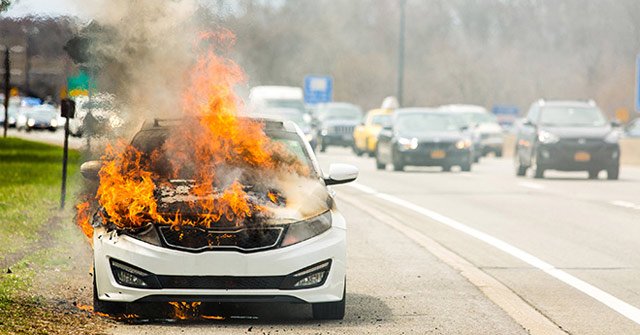The cause of cars burning and timely handling
Here are the causes that make cars vulnerable to fire and how to handle them in a timely manner to avoid.
1. Fuel and liquid leaks
Fuel leaks, particularly gasoline, are one of the most common causes of car explosion.
Gasoline can evaporate on its own at 7.2ºC, spontaneously ignite at 257.2ºC in the presence of air, and easily ignite when encountering small sparks. Therefore, if gasoline is leaked on hot metal or plastic, the chance of spontaneous combustion is very high.
In addition to gasoline, there are many other types of fluids such as gearbox oil, brake fluid, engine lubricating oil, steering power oil, and even engine coolant, if leaking, it is very flammable. When the engine is in operation, liquids circulate and easily leak if the pipes or containers they collide with are subjected to severe shocks, posing a risk of fire.
To prevent leakage of fuel and liquid on the vehicle, the owner should regularly check and maintain the vehicle properly.
2. Short-circuit the power
Electrical system of the car is arranged everywhere. When an electric shock occurs, 1 spark will be released and if the vehicle is leaking flammable substances, it may cause a fire.

3. The motor is overloaded
Overheating engines cannot ignite on their own but can cause the rubber or plastic gaskets to malfunction, resulting in leaks of engine internal fluids such as fuel, oil, and coolant. These liquids when falling on other parts such as exhaust pipes are very flammable.
4. Fuel quality does not meet standards
Fuel quality must meet standards. If for any reason, there is a strange toxic substance in the fuel, it will accelerate the process of corrosion, metal aging, making bottles, rubber tubes, details.
5. The catalytic converter is overheated
Most cars now have exhaust systems that run all the way. The catalytic converter of this system, where the CO combustion reaction and unburnt fuel are pushed out to the environment, is the hottest part of the car.
Typically, the temperature at the catalytic converter is only 648,9ºC to 871,1ºC but can be increased to 1093,3ºC when the engine is inefficient operation, the amount of unburnt fuel must be treated here. big. This causes the surrounding insulation to burn and spread to other parts such as car floor, carpet, causing car fire.
6. Open exhaust
Long-term use of cars can cause car exhaust pipes to corrode, causing gaps and leaking hot air. Hot exhaust fumes from leaks will catch fire with flammable materials that get caught in the chassis like cloth, plastic bags, paperboard . In addition, if the gasoline in the car's cylinder is not burned out, they Will continue to burn outside the exhaust pipe, causing easy car explosion.
7. Collisions, accidents, car crashes
In the event of an accident, the vehicle is subjected to a collision so that the fuel may leak to the engine hot spot or accidental sparks will appear, causing the vehicle to ignite. Therefore, when the vehicle is hit by a collision, people on the vehicle must find every way to get out of the car and move away from a safe distance as quickly as possible.
8. Errors from the design of the manufacturer
A few minor flaws from the manufacturer's design, such as an open pipe connector, an unsealed gas tank cap, an unscrewed screw . caused fuel, liquids to leak, combined with sparks. The electricity comes from worn-out wiring systems that can cause a disaster.
How to handle quickly when a car is on fire?

- Stop: If you are driving, you smell smoke or detect a fire, stop at a curb away from the road, away from flammable substances, lock the fuel tank, turn off the ignition.
- Extinguish fire: Use items that have been previously equipped in the vehicle to put out fires such as sand, sacks, absorbent cloth, fire extinguishers, etc.
- Escape: Open the seat belt quickly, open the car door to escape. If the jammed door cannot open, use a specialized hammer, sharp, hard objects or elbows to break the glass. During this process, make sure you cover your nose and mouth to avoid suffocation. When traveling by car, bring a water bottle and towel with you in case of possible fire emergencies.
- If there are people in the car, help them out. Then quickly run away from the vehicle to avoid being affected by heat and the risk of fire.
- Call fire, medical, and police units.
10 milestones of regular maintenance help cars always in the best condition
You should read it
- ★ Take a ride on Tesla's self-driving car and watch the self-driving Tesla car video on the real road
- ★ How to Buy and Sell Cars for Profit
- ★ Guidance on registration of cars, granting of license plates via the Internet
- ★ The EU aims to bring speed limiting technology to all cars in the near future
- ★ Dizziness watching the reconstruction of the Formula 1 racing car shattered after 12 hours